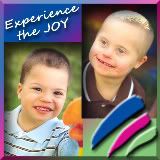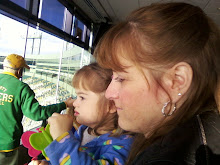So all this talk of how Ferguson (2003) characterizes the predominant views professionals have of us parents of children with disabilities, may seem like it is all doom and gloom. But Ferguson gives us hope and talks about the importance of looking at how parents succeed in their journey raising their child with a disability. Let’s not just focus on the negative aspects, let’s look at the positive things, the success stories – what it takes to be able to look back and recognize that you succeeded in this journey. I don’t know about you, but this is my ultimate goal.
One model he looks at involves two important factors worth noting – what resources does the family have (remember the importance of that) AND how does the family define the diagnosis. On the last point, I am still working on creating my path, but I do think that Quinn having Down syndrome is making our family stronger, more sensitive, and closer. I doubt we would be where we are today without her in our lives. The biggest change I see in all of this is in the sensitivity in our boys. Yes, even my wild guy Aidan is more open to differences. He was talking today about how Quinny may become a ballerina. Very cool given her sure-steps and everything! And with Riley, let’s just say that his heart is just so beautiful.
Ferguson also talks about the importance of three characteristics families must have to succeed – they must be adapting, evolving, and active. You must be able to adapt to change. The stress level will go up and down over time and then back up again. It is very important to be able to adapt and not be rigid in how you approach things. Remember my discussion about grief and loss – things can go back and forth, so you must be able to adapt. In addition, your concerns change over time. I am still very early on in this journey. Later we will be experiencing different transitions and struggles. This not only relates to adaptation, but the evolution of your child’s development and needs, and there are changes that take place in what you must face. Your needs evolve. Finally, you must be active. Have routines, go out, connect with others – this counters those views from the 1950s that lean towards isolation. People must see us out in the world – this will only aid awareness and sensitivity over time.
The last positive part that Ferguson notes is all the positive outcomes of having a child with a disability. If you play your cards right and become one of the success stories, these can include improvement in the following: coping skills, family harmony, spiritual growth and shared values, shared parenting, and communication. I cannot emphasize how much Quinn has changed my life and the life of our family. I just have to keep going back to these important components and secrets of success. We should look at these on a regular basis and think about what we need to do in order to continue to develop – how do we define the diagnosis; do we have our resource; and are we adapting, evolving, and being active? It should be about positive growth and success, not pathology. I challenge all of you who are in the helping professions to think about this in your work with clients, students, families, etc. So ends my Ferguson discussion….He definitely gives us a lot to think about, and I am happy to have found his work.
-Karyn
What day is it, even?
5 years ago


















No comments:
Post a Comment